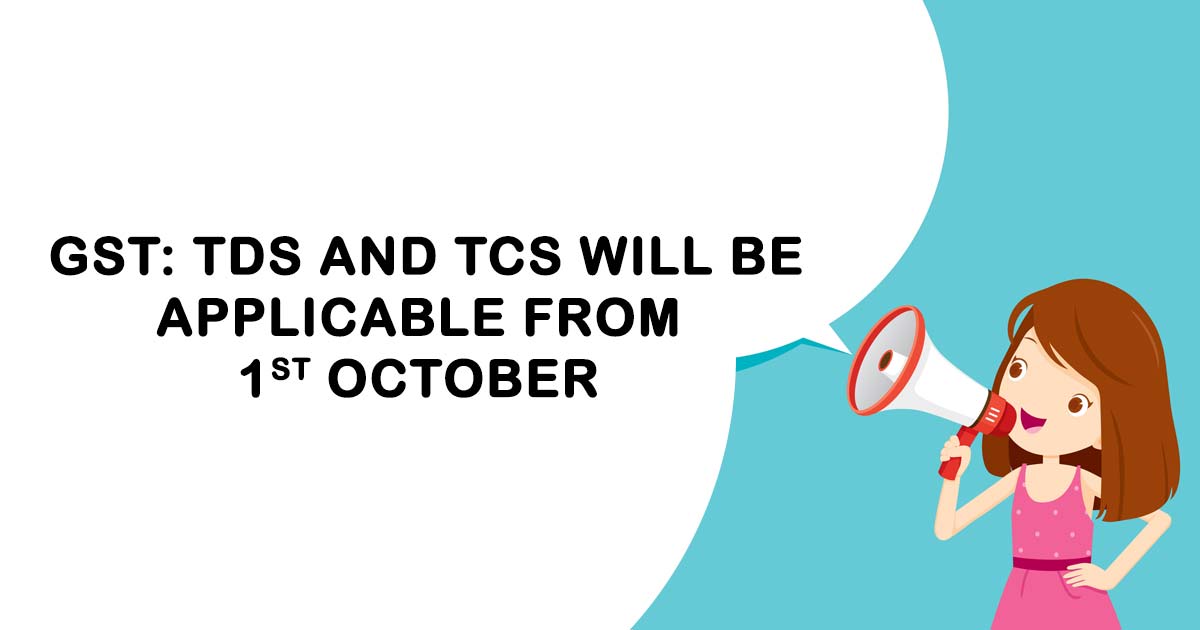The government has directed the E-commerce companies to start collecting up to 1 percent TCS in the course of making any payment to suppliers under GST. Also, the notified entities are directed to collect TDS at one percent on the payments done to the suppliers of Goods or services. The Tax deducted at source (TDS) and Tax collected at source (TCS) provisions would be applicable from 1st of October as notified by the Government.
Below are the details of TDS and TCS procedures.
TDS Procedure for Implementation
Tax Deducted At Source
- A department or establishment working under the Central or State government
- A local Authority
- Government agencies
- A person or a particular category of person who has been notified by the central or the state government and are recommended by the Council.
When is TDS taxable by the supplier?
The supplier of Taxable Goods or services is liable to deduct the TDS at the rate of 2% under GST when the value of supply of any goods or services under a contract exceeds Rs 2,50,000.
A TDS deductor on a compulsory basis is required to be registered in GST irrespective of threshold limits.
Required: TDS Certificate
The Registered supplier (deductor) is supposed to provide the deductee with a certificate in Form GSTR-7A within a time span of five days of crediting the amount being deducted by the Government. The details required to be mentioned on the certificate is the contract value, rate of deduction, the amount deducted and the amount paid to the Government.
The amount which has been deducted by the deductee shall be paid to the Government within ten days of the month in which the deductions are made. Under Section 39(3) the deductee could ask for the ledger entry of credit of the tax deducted in his electronic cash ledger.
The GSTR-7 form could be filled on or before 10th of the following Month.
TDS Procedure for Implementation
Tax Collected At Source
The e-Commerce operators are eligible to collect TCS When taxable supplies are made to happen by other suppliers through an e-commerce operator who is not an agent and the consideration amount is supposed to be collected by the operator.
Some of such operators in India are Companies like Amazon, Flipkart, Jabong, Snapdeal, Shopclues, etc. As per law, these operators are supposed to be registered in GST irrespective of the threshold limits. Also, all the other suppliers who supply Goods and services through an e-commerce operator should get them registered under GST.
The rate of TCS deduction is at 1% under CSGT, 1% under SGST and 2% under IGST.
Just like TDS, the amount of TCS paid to the government by an operator must be made within 10 days after the end of the month in which the TCS collection was made.
In addition to this, the e-commerce operator is required to provide the deductee with a monthly statement in GSTR 8 by the 10th of the following month. Also, they are required to file an Annual statement in Form GSTR 9B by 31st of December following the end of every financial year. All the tax collected by the e-commerce operator must be credited to the cash ledger of the supplier, who had supplied the goods or services through that operator.
Every tax collected by the operator must be credited to the cash ledger of the supplier who has supplied the goods/services through the operator. The supplier could further claim for credit of the tax collected and reflected in the tax return by the Operator in his electronic cash ledger.
Some More Hightlights over TDS and TCS under GST
According to the Central GST act, the notified entities are directed to collect TDS at 1 percent in on the payments done to the suppliers of Goods and services in excesses of Rs 250 thousand. States would also Levy 1 percent TDS under state law.
Just like that, the E-commerce companies would now collect up to 1 percent TCS while making any payment to suppliers under Goods and Services Tax (GST). States too can charge up to 1 percent TCS under State GST (SGST) law.
The E-commerce companies for TCS and the other notified entities i.e PSU’s and the Government companies for TDS are directed to get their ERP’s updated soon to comply with these provisions by 1st October. The industry now actually requires to gear up to get things updated in their systems by the date notified.
It is expected that the idea of TCS and TDS would help the tax department to penetrate more in the Economic system and would be proved to be the doorway to get direct and the indirect taxes evaded.
As earlier, when GST came into practice from 1st July 2017, TDS and TCS provisions of GST was kept aside just in order to make the GST tax collection simpler for businesses and not to make the Tax collection process complicated and thus was postponed firstly till June 30 and later till September 30, 2018. Now, it would be implemented full-fledged.









